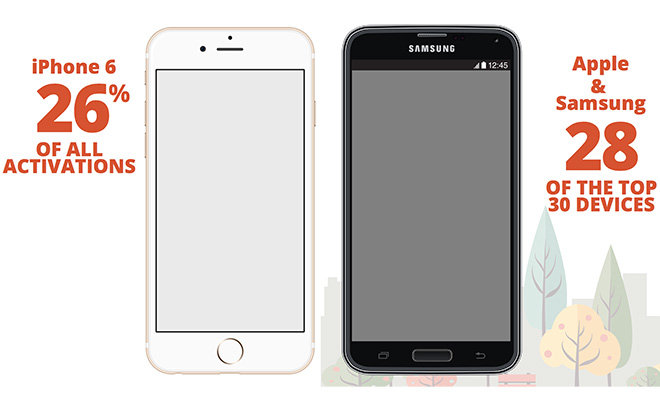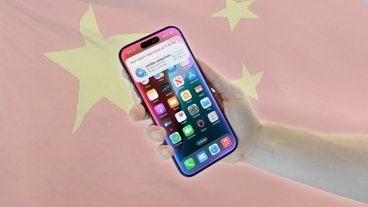Riding a wave of record-breaking iPhone sales, Apple remained the market leader in enterprise mobile device activations for the first quarter of 2015, but competitors are slowly eating away at iPad's tablet share, according to Good Technology.
In its Mobility Index Report for the first quarter of 2015, enterprise mobility solutions firm Good Technology found Apple's iOS accounted for 72 percent of all mobile device activations, dropping a single point quarter-over-quarter to Google's Android. Since introducing big-screened iPhone 6 and 6 Plus models, Apple has commanded a 70 percent share of the market.
Building on a strong performance last quarter, Apple's iPhone 6 came in as the most popular enterprise device for the three-month period ending in March, notching 26 percent of all activations. For Android, Samsung's Galaxy S5 took the top spot.
Mirroring consumer trends, Apple and Samsung dominate the mobile market for enterprise solutions. Together, the two companies produced 28 of the top 30 devices tracked in Good's study.
Windows Phone activations held steady at one percent of all device activations. Tablets running Windows Pro helped net Windows one percent of the whole, marking the first time Microsoft's hybrid operating system made it into Good's Mobility Index Report.
Although iPad led the pack in tablets, Apple saw its share drop to 81 percent in the first quarter, down four percent sequentially. Over the past year, Android and Windows devices chipped away at iPad's position, which at one point accounted for 92 percent of the market.
Specifically, Android's share of the enterprise tablet market nearly doubled since early 2014 and now stands at 15 percent after a one-percent bump in quarter one. Microsoft's Surface lineup also sparked interest with certain industries, as Windows saw its share rise from one percent to four percent over the same period.
Good's data showed iOS outpacing Android in regulated industries for the second quarter in a row. According to the report, 80 percent of public sector activations and 76 percent of financial services activations went to iOS.
As expected, Apple's strongest industry was education. Schools have long turned to Mac, and more recently iOS, devices for their teaching needs, in no small part thanks to Apple's aggressive "iPad in education" marketing efforts.
For its most recent study, Good Technology aggregated activation data from its global customer base of more than 6,200 organizations spread across 189 countries. As Good does not have access to BlackBerry's wholly controlled Enterprise Server, results for BlackBerry products were not included in the report.
 Mikey Campbell
Mikey Campbell







-m.jpg)






 Charles Martin
Charles Martin
 Christine McKee
Christine McKee
 Wesley Hilliard
Wesley Hilliard
 Malcolm Owen
Malcolm Owen
 Andrew Orr
Andrew Orr
 William Gallagher
William Gallagher
 Sponsored Content
Sponsored Content








16 Comments
Hard to consider 81% eroding market share; seems more like a lack of a catalyst to reduce the replacement cycle, unlike the Windows tablets and to some degree Android offerings. In my book, that is mostly a healthy market. Personally, I would love to upgrade my iPad Air 128GB/LTE, but can't justify $830 for a touchID sensor. For me it would take 256GB at the same price point to move the needle. Slower refresh cycles make them much more attractive for business though! If one or two of the critical apps we used was properly web enabled rather than being dependent on Windows I could justify buying half the staff iPads. The workarounds with RDP are too ineffective now.
Apple is going to be facing tougher competition in the enterprise tablet market for the following reasons: 1. Balmer is gone. 2. Intel is finally out with their new broadwell chips. 3. Ballmer is gone. 4. Windows 10 is coming. 5. Ballmer is gone. 6. Jobs is also gone.
Apple is doomed.
Apple is going to be facing tougher competition in the enterprise tablet market for the following reasons:
1. Balmer is gone.
2. Intel is finally out with their new broadwell chips.
3. Ballmer is gone.
4. Windows 10 is coming.
5. Ballmer is gone.
6. Jobs is also gone.
1, 3, and 5 are only a short term improvement for Microsoft. Windows 10 will have issues being adopted because of the lack of ActiveX in their new browser (IE will be available but I can't see it being supported for long). The joke about Windows 11 never being released (Windows 10 will just have continuous updates) is simply a recognition that Windows 10 is simply NT with window dressing (yes, OSX can be seen as the same thing). Microsoft hasn't really come up with anything new in years, they have been in a holding cycle since they became entrenched in the enterprise. What Intel does really doesn't matter. Enterprises will buy whatever's available when they need to replace their damaged PCs.
As for #6, Jobs is only physically gone, he's still there in spirit and Apple is still a great company.
[quote name="rob53" url="/t/186204/apples-ios-holds-lead-in-enterprise-for-q1-on-strong-iphone-6-demand-but-tablet-share-eroding#post_2722112"]1, 3, and 5 are only a short term improvement for Microsoft. Windows 10 will have issues being adopted because of the lack of ActiveX in their new browser (IE will be available but I can't see it being supported for long). The joke about Windows 11 never being released (Windows 10 will just have continuous updates) is simply a recognition that Windows 10 is simply NT with window dressing (yes, OSX can be seen as the same thing). Microsoft hasn't really come up with anything new in years, they have been in a holding cycle since they became entrenched in the enterprise. What Intel does really doesn't matter. Enterprises will buy whatever's available when they need to replace their damaged PCs. As for #6, Jobs is only physically gone, he's still there in spirit and Apple is still a great company. [/quote] I'd go so far as to add re #6 that Steve's vision was so clear that it keeps getting sharper, wider and deeper. It's a little-known fact about flashbacks that they don't die with you but are transmitted forward into the world at large, where they really start to create beneficial effects.